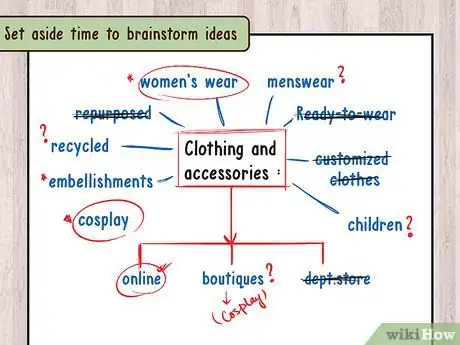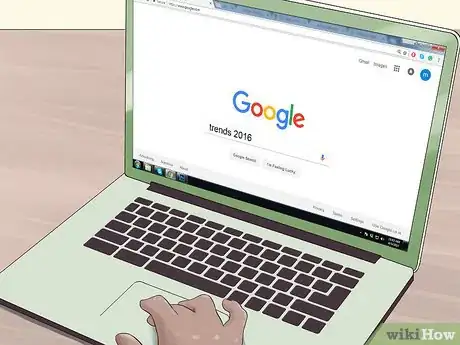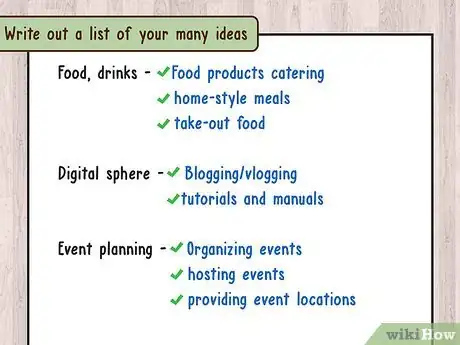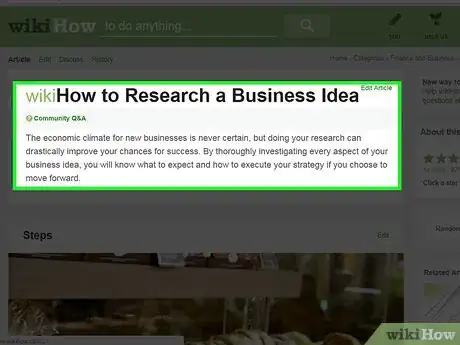This article was co-authored by Helena Ronis. Helena Ronis is Co-founder and CEO of AllFactors, a unified web analytics software to drive company's marketing and business growth. She has worked in product and marketing in the tech industry for over 8 years, and studied Digital Marketing & Analytics at the MIT Sloan School of Management Executive Program.
This article has been viewed 30,306 times.
Business ideas are all around you, but it is difficult to find one that you know you can work with and that is going to fulfill a need that people will actually pay for. Finding ideas for a business requires brainstorming and matching your skills and interests to the ideas. Realize that no idea is too ridiculous to begin with, as you will filter out the ideas to the realistic ones after you're done brainstorming.
Steps
-
1Set aside time to brainstorm ideas. This can be done on your own or with someone else. That person could be an ideas person, a friend or the person you're planning on going into business with. That's entirely up to you.
- Carry a notebook wherever you go. A business in one part of the world is an idea in another and you just never know what you may spot as you go around your daily activities, for little things observed can spark large ideas.
-
2Consider what things interest you first. This will at least narrow down your choices to particular industries, services, goods, etc. It will still be very broad but at least you won't be thinking about areas that won't have anything to do with your interests.
- Write down all the things you can think of that inspire you and are something you consider you'd be good at producing, selling, marketing, etc.
- Don't be too limited at this stage by your skill set. You can always learn new skills if needed. However, be realistic about your enthusiasm, because it will underpin your energy levels and determination to keep trying.
- Throw your dreams into the business ideas pile. They may seem sky high or unrealistic but they may eventually be achievable or they may indicate elements of what you could be doing. Don't discard anything at this brainstorming stage.
Advertisement -
3Consider what things are needed in society. What services, goods or combination of both is missing or is poorly done to date? What problems or inconveniences are people facing in their daily lives, workplaces and businesses that you might be able to fix for them? What solutions can you think of while brainstorming?
- Ask why something hasn't been addressed yet. Is it too hard? Is it just overlooked? Is it so new that people are scared to try solutions? Add these considerations to your mix of ideas.
- Don't forget that many areas are evolving. For example, "information products" is a large and expanding area of business, ideas for which can include anything from blogging and vlogging to software, ebooks and digital boot camps. You might even invent new products and services that don't yet exist but will enhance people's lives when created.
-
4Check out existing trends. Think like a hipster and be ahead of the pack. New ideas, niches and possibilities are constantly forming. Are there ways that you can ride these waves while they are still new and barely known? Sure, some will be risky but that is often where your best ideas and innovations will come from. Trends provide opportunities for amazing business ideas that few have cottoned onto yet.
-
5Consider your own needs. These differ from interests, in that you need to think about what you're capable of doing and the approach you're prepared to take. For example, do you want to set up a business from home, in a store, office or warehouse or a virtual business? Each has advantages and drawbacks, and it can depend on your lifestyle needs and the stage of life you're at. How do your ideas fit with your daily needs?
-
6Learn from other people. Read books, articles and other materials by and about business people you admire, to learn about their approaches to coming up with and executing business ideas. List any of their approaches you find inspiring and useful.
- Listen to TED Talks, attend webinars and do online courses to assist with your ideas. There is plentiful material available in the online sphere for you to draw on to assist with your brainstorming and learning.
-
7Write out a list of your many ideas. Use mindmaps or similar diagramming devices to help you sort through the ideas and their linkages. Which ideas are leaping out to you as the most interesting ones that are also potentially workable? Start whittling them down to a set of business ideas that are likely to be actionable.
- If you can build, glue, make, sew, bake, create, etc., mock-ups or prototypes of your idea, go ahead and do so. This can add to the realization of how the business idea might look and/or work. It doesn't have to be anywhere near perfect at this stage, just enough to help you realize the idea's worth.
-
8Read How to research a business idea once you have settled on a particular idea. This will help you to work out how viable your idea is in relation to the existing market, competitors and needs. This is the time when you whittle down the dreams to realistic and doable actions, and rein in anything that would prove too costly, difficult or lacking in interest to people.
Business Ideas List
- Food, drinks –– Food products, catering, home-style meals, liqueurs/spirits, take-out food, food craft, etc.
- Digital sphere –– Blogging, vlogging, ebooks, tutorials, videos, manuals, photos, artwork, etc.
- Clothing and accessories –– Ready-to-wear, customized clothes, repurposed, recycled, embellishments, babies and children, women's wear, menswear, cosplay, etc.
- Event planning and hospitality –– Organizing events, provision of event equipment, hosting events, providing event locations, etc.
- Health care –– New inventions for better health outcomes, care packages, carer help, healthy products, providing building services for health care facilities, etc.
- The future –– Inventing the as yet unknown for making the world a better place.
Expert Q&A
Did you know you can get expert answers for this article?
Unlock expert answers by supporting wikiHow
-
QuestionHow can I protect my business idea if I want to talk about it but don't have the legal rights to it yet?
 Helena RonisHelena Ronis is Co-founder and CEO of AllFactors, a unified web analytics software to drive company's marketing and business growth. She has worked in product and marketing in the tech industry for over 8 years, and studied Digital Marketing & Analytics at the MIT Sloan School of Management Executive Program.
Helena RonisHelena Ronis is Co-founder and CEO of AllFactors, a unified web analytics software to drive company's marketing and business growth. She has worked in product and marketing in the tech industry for over 8 years, and studied Digital Marketing & Analytics at the MIT Sloan School of Management Executive Program.
Business Advisor It depends on what you're executing and what needs protection. There are plenty of ideas out there—it's all about the execution. Protection of an idea isn't necessarily what you need unless it's literally a patent or a completely new way of doing things. In that case, you'll need to talk with a patent attorney or a trademark attorney.
It depends on what you're executing and what needs protection. There are plenty of ideas out there—it's all about the execution. Protection of an idea isn't necessarily what you need unless it's literally a patent or a completely new way of doing things. In that case, you'll need to talk with a patent attorney or a trademark attorney.



































































